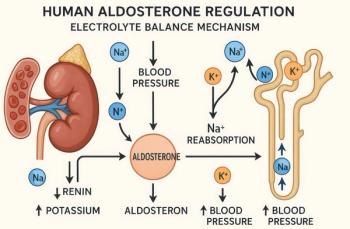
Are Prescribing Practices for Antihypertensives Primitive? The Truth Hurts
A recent issue of the Wall Street Journal contained a stark statement about the contemporary management of hypertension. "Our current prescribing methods are very primitive," said Dr Michael Alderman, coauthor of a study recently published in the American Journal of Hypertension.
A recent issue of the Wall Street Journal contained a stark statement about the contemporary management of hypertension.1 "Our current prescribing methods are very primitive," said Dr Michael Alderman, coauthor of a study recently published in the American Journal of Hypertension. Ouch! After reading the other new studies in the same issue of that journal, it appears that in this instance, the truth hurts.2-5
It has been suspected for some time now that there are substantial differences among responses to anti-hypertensives-usually divided into 5 groups: β-blockers, diuretics, α-blockers, angiotensin-converting enzyme (ACE) inhibitors and angiotensin receptor blockers (ARBs), and calcium channel blockers-based on age and race. For example, β-blockers can raise rather than lower blood pressure in some African Americans. The bottom line is that "one size does not fit all" with hypertension, and renin levels may be the key to unlocking the heterogeneity.
RENIN IS KEY TO BLOOD PRESSURE RESPONSE
Two of the recently published studies demonstrated that the differences in response to select antihypertensives reside in the patients' renin category: high, medium, or low.2,3 Persons with low-renin hypertension, for example, seem to have an elevated blood pressure because of excess volume; in those with high-renin hypertension, just the opposite occurs. Excess volume–mediated blood pressure should respond best to diuretics, and high-renin hypertension to β-blockers, ACE inhibitors, and ARBs.
More disconcerting, however, was the observation that inappropriate medications could actually raise blood pressure. Antirenin drugs (β-blockers, ACE inhibitors, and ARBs) caused a pressor response in some patients with low and medium renin levels.2 It seems that older persons and African Americans would benefit from drugs that treat volume or low-renin hypertension, such as diuretics.
Similarly, in another study, 3 ethnic groups exhibited disparate responses to different groups of antihypertensives.4 Among patients who were randomized in the Anglo-Scandinavian Cardiac Outcomes Trial (ASCOT), those of European, African, and South Asian ancestry were studied. They were given initial monotherapy with either atenolol or amlodipine; when add-on therapy was required, a thiazide or perindopril was used.
As expected, black patients were less responsive to the β-blocker. Amlodipine was effective in all groups. When perindopril was added as a second agent to the regimen of black patients, it was less effective than in the other ethnic groups.
FIVE TAKE-HOME MESSAGES
The editorialist suggested 5 "take home messages"6:
Although primitive is a strong word, it is time to tailor antihypertensive therapy by race and renin level. The old paradigm is unacceptable and may actually raise rather than lower blood pressure.
References:
REFERENCES:
1.
Naik G. Getting the right hypertension drug. Wall Street Journal. August 24, 2010:D3.
http://online.wsj.com/article/SB10001424052748704340504575447561250990930.html#articleTabs%3Darticle
. Accessed September 14, 2010.
2.
Alderman MH, Cohen HW, Sealey JE, Laragh JH. Pressor responses to antihypertensive drug types.
Am J Hypertens
. 2010;23:1031-1037.
3.
Turner ST, Schwartz GL, Chapman AB, et al. Plasma renin activity predicts blood pressure responses to beta-blocker and thiazide diuretic as monotherapy and add-on therapy for hypertension.
Am J Hypertens
. 2010;23:1014-1022.
4.
Gupta AK, Poulter NR, Dobson J, et al; ASCOT. Ethnic differences in blood pressure response to first and second-line antihypertensive therapies in patients randomized in the ASCOT Trial.
Am J Hypertens
. 2010;23:1023-1030.
5.
Brown MJ. Heterogeneity of blood pressure response to therapy.
Am J Hypertens
. 2010;23:926-928.
6.
Furberg CD. Renin-guided treatment of hypertension: time for action.
Am J Hypertens
. 2010;23:929-930.
Dr Rutecki reports that he has no relevant financial relationships to disclose.
Newsletter
Enhance your clinical practice with the Patient Care newsletter, offering the latest evidence-based guidelines, diagnostic insights, and treatment strategies for primary care physicians.

































































































































